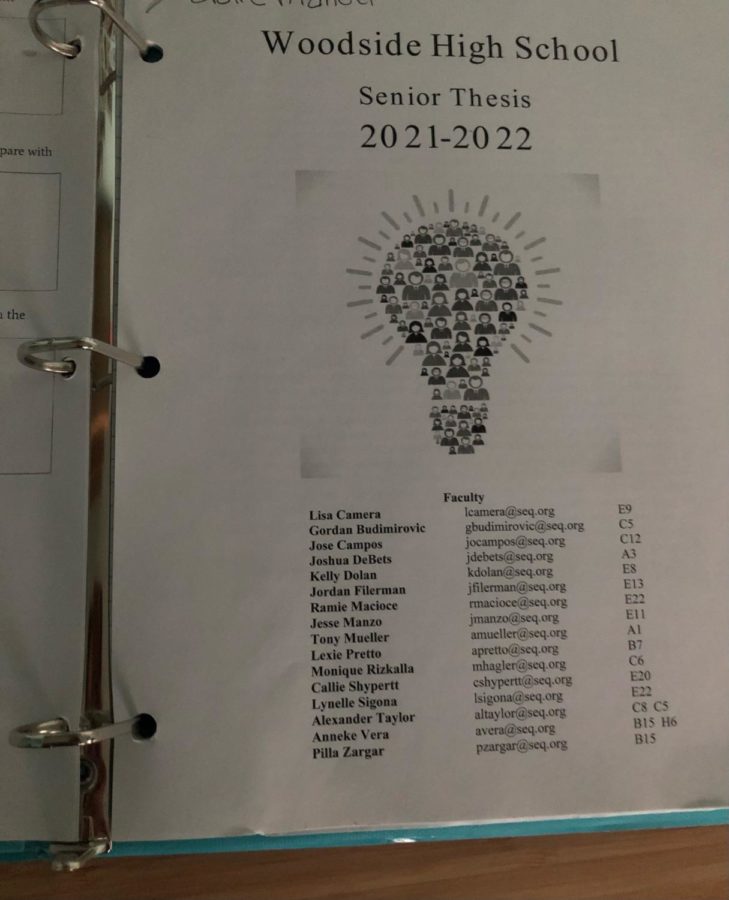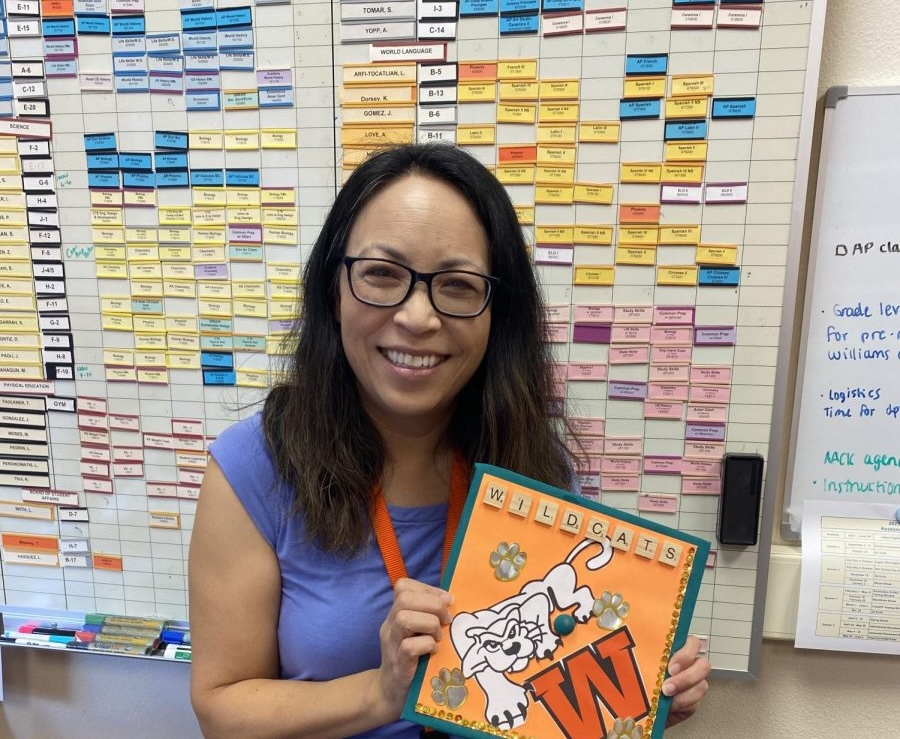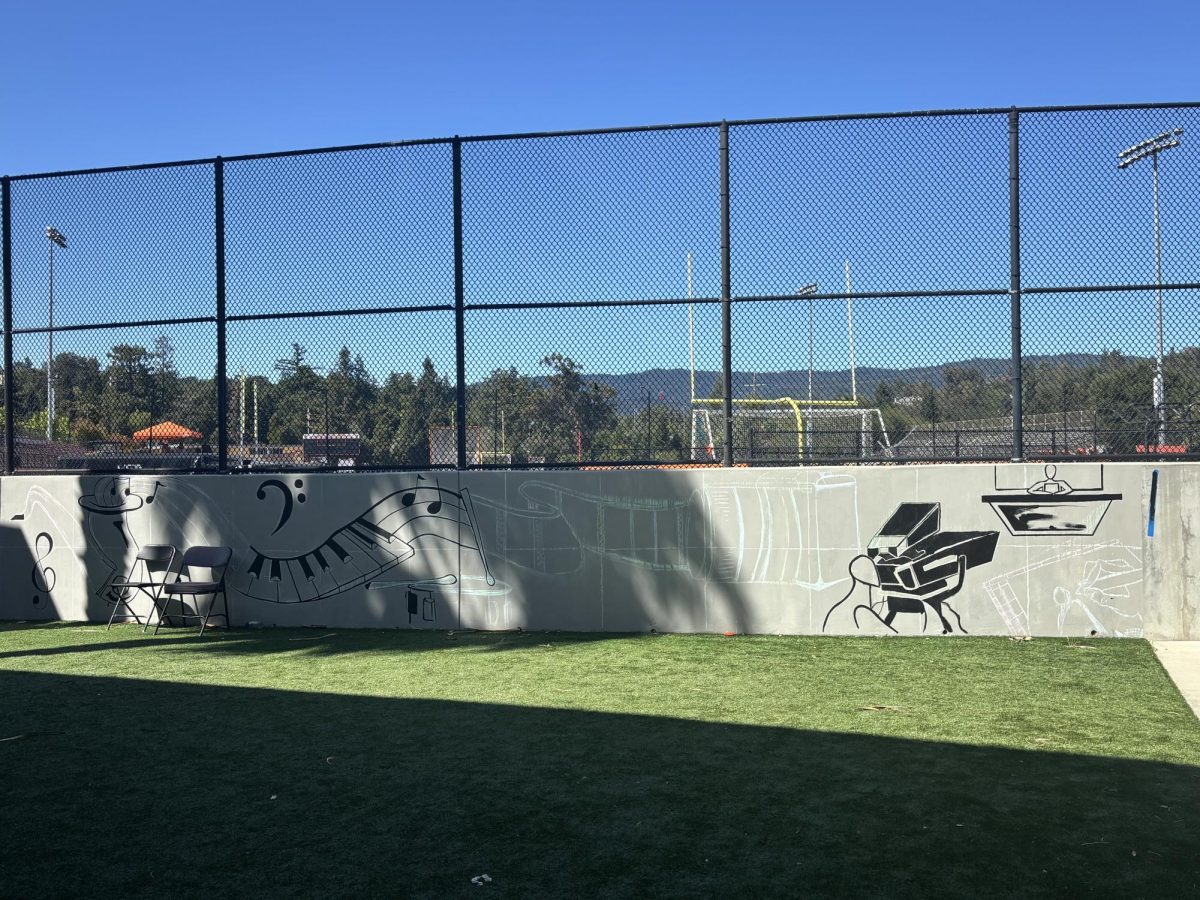An issue concern form questioning the validity of the senior thesis has brought an often silent, yet longstanding conflict into the spotlight at Woodside.
The senior thesis is an extended research paper that all seniors are required to write. The process is guided by senior English and social studies teachers. Woodside is the only school in the Sequoia Union High School District to require students to complete a senior thesis project.
Woodside’s Diversity and Equity committee, a senior student, and a parent of a senior brought an issue concern form to the attention of the administration in November. The issue concern form was raised in hopes of disbanding the senior thesis by highlighting the reasons they believed the senior thesis is negatively affecting participating students. On April 25, the principals and vice principals presented a plan to address some of the concerns, but it has not yet been approved. The meeting went over the concerns brought forward on both sides including a slide show with the counterargument addressing the issues brought up with the senior thesis.
The main group behind the issue concern form was the Equity & Diversity Task Force, which started in the summer of 2020 to develop and propose a framework for equity and diversity for school sites in the district to adapt to their needs.
“[The task force] will further empower and enhance the opportunities and outcomes of currently underrepresented communities of the SUHSD,” Miguel Cervantes and Ann Hanson, teachers and co-leaders of the Equity and Diversity Task Force explained.
One of the council’s major projects for the 2021 to 2022 school year was the issue concern form, which addressed concerns about teaching and learning in relation to the Senior Thesis.
“Dating back to the 2020-2021 school year to present … we decided that the concerns had been voiced by enough stakeholders that it warranted submitting an Issue Concern Form,” Cervantes and Hanson explained.
Lisa Pai, a senior parent, filled out an issue concern form addressing some of her own concerns about the senior thesis. Pai’s concerns centered around a lack of equity in the district.
“Our seniors are the only ones in the district with this additional burden during a crucial time for college application deadlines and semester grades,” Pai expressed.
The senior thesis is spread out over the majority of students’ senior year, starting in November and not ending until late April.
“The future seniors should … not be overburdened during a year that determines their future educational course, as well as gives them the opportunity to celebrate and rest from all of their hard work through their high school career,” Pai expressed.
Another concern over the senior thesis raised by the Equity and Diversity District Council was a disparity between different levels of English proficiency. In addition to mainstream and Advanced Placement (AP) English courses, Woodside also has Limited English Proficient (LEP) and English Language Development (ELD) English classes. Jayu Mehta, Chair of the Special Ed Department, found a lot of benefits in the senior thesis, but also saw issues her students have faced.
“As a senior study skills teacher [I think] it’s a wonderful project, but my seniors really struggle with it,” Mehta said. “[An issue] is they’re reading some articles well above their reading level.”
Senior Laura Carvalho also wrote an issue concern form. She gathered over 25 signatures from seniors.
“There are better options for us to learn real-world skills and values,” Carvalho explained. “We do believe it is necessary to have a senior project, but it should be a project that can affect our community and our environment directly.”
The senior thesis has not been met with entirely negative responses. Some students have enjoyed the process of the senior thesis.
Over the years, Co-Head Counselour Fransico Negri received a mixed bag of feedback on the senior thesis.
“It varies for some students,” Negri said. “They feel like it’s extended through a long period of time… But there’s a lot of feedback that the experience was helpful for them to understand how to write a research paper.”
Some seniors, such as Brynn Ayoob, see a lot of benefits in the senior thesis project.
“I really like the senior thesis,” Ayoob said. “I look forward to working on it. I love my topic, and I think that’s why I like it so much. But I think it’s better than the alternative of just writing … on topics that the teachers give.”
Ayoob pointed out that hers was not a very commonly held opinion.
“Everyone hates senior thesis and everyone looks at me like I’m crazy,” Ayoob said. “I think a lot of people just…pick topics they enjoy but not ones that they wanted to research this extensively.”
AP Literature and Composition teacher and one of the creators of the senior thesis, Lisa Camera, sees this work as not an extra load but instead as a curriculum necessary for senior English and social studies courses.
“[The senior thesis] became really a scaffold for learning how to write and learning how to do research specifically,” Camera said. “I think that the end product is when students are able to graduate with confidence they know the writing process. It’s worth it. ”
The Head of the English department, Tony Mueller, wrote a thorough response to the multiple issue concern forms raised. In his response, he addressed the benefits and importance of keeping the senior thesis.
“Mastery of academic standards… ultimately dictates the curriculum,” Mueller addressed. “During the senior thesis, students select a topic of their choice and find their own sources to research which helps to engage students in a way that other projects may not.”
With all its imperfections Camera still believes the senior thesis is necessary.
“There’s a lot of factors that are difficult to control anytime you are trying to serve a large population…It’s not perfect,” Camera expressed. “But it’s the best we have.”












